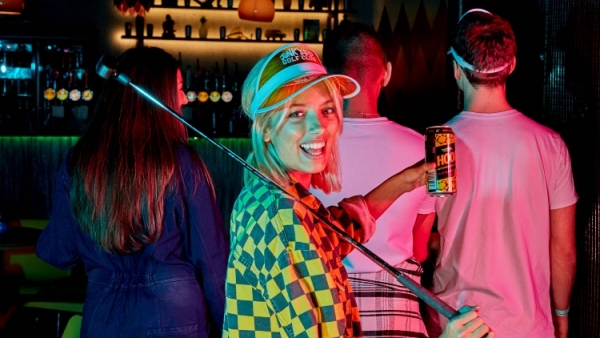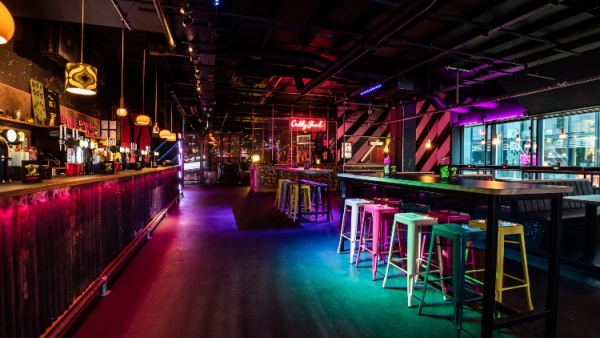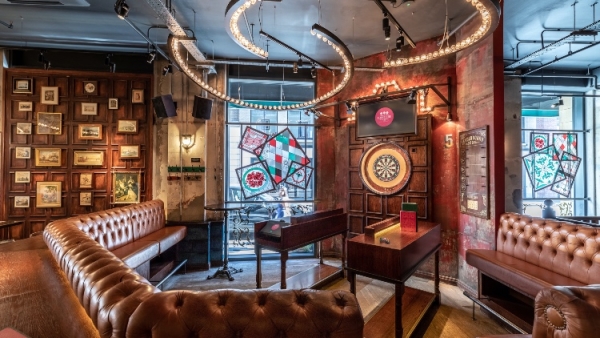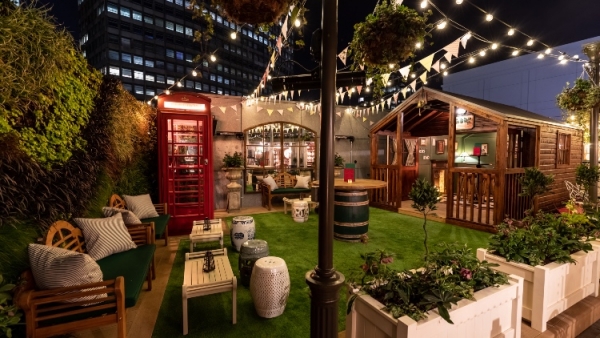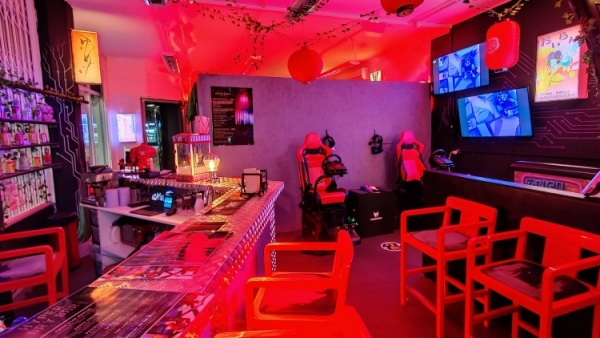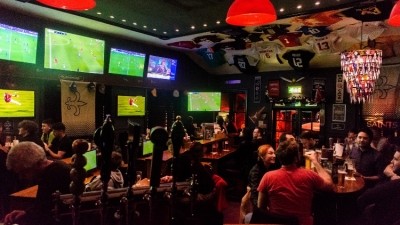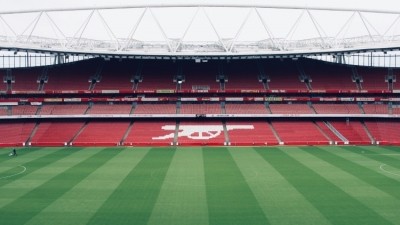Could the ‘new normal’ mean game over for competitive socialising venues?
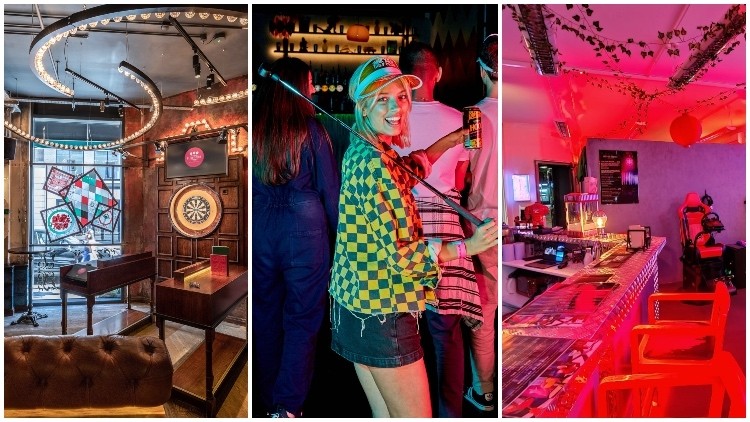
This means the ongoing pandemic presents a huge challenge for operators looking to keep shared equipment sanitised and free of Covid-19, which early research cited by the World Health Organisation found could survive on surfaces from two hours to a number of days.
With this considered alongside the swathe of broader hospitality sector challenges such as the 10pm curfew, restrictions on household mixing in parts of the country and the end of the furlough scheme, operators would be forgiven for thinking it could be ‘game over’ for competitive socialising.
Yet, while the Department for Business, Energy and Industrial Strategy (BEIS) stated that pubs opening on 4 July should discourage customers from playing indoor sports, the likes of “booze and ball games” operator Roxy Leisure and social darts concept Flight Club scheduled reboots from early August.
Resilient business
Five-strong cocktail and crazy golf bar operator Junkyard Golf’s MD Sam Jones explains that despite having to level-up measures around physical distancing and additional cleaning since reopening in August, the business remains confident of weathering the storm.
New Covid-secure measures include the addition of partitions and screens in bar areas and operating a table service-only bar through an app, in a bid to reduce contact points between guests and staff.
What’s more, additional duties such as cleaning and sanitising golf balls after every game have been added to staff workloads while hand sanitiser dispensers are now par for the course.
“The biggest change we have made is to our capacity, in order to allow social distancing on the courses we have reduced our available tickets by just over half,” Jones explained. “Sales in August and September were ahead of our post-lockdown forecast and we were delighted guests had returned in numbers and the reduction in tickets resulted in more sold out time slots.”
This optimism is, however, tempered by the ever changing and “seemingly scattergun approach” to restrictions – in particular, the Government’s introduction of a 10pm curfew.
“It seems counter intuitive to remove people from regulated and risk assessed venues, specifically set up to socially distance and put them all out on the streets at the same time,” Jones continued.
“This coupled with the end of the furlough scheme, the potential for a second lockdown, next quarter rent payments and deferred VAT will result in a perfect storm that many businesses will not survive without further support.
“Junkyard Golf Club is a remarkably resilient business and post-lockdown we have been blown away by the support of our guests and the adaptability and hard work of our teams.
“We are confident that we will weather this storm but a more measured approach from the Government is needed to help hospitality as an industry.”
Jones added that people's desire to go out, socialise and have fun experiences will not be diminished and the best businesses will continue to capitalise.
“The challenges we have faced and the experience in maintaining adaptability has given us newfound strength and knowledge we didn’t know we had. It’s about trying to keep a positive attitude and constantly welcoming change rather than resenting it.
“Learning to ride the waves and not push against them.”
Tough decisions afoot
Flight Club, which operates six social darts sites in the UK, and Electric Shuffle, currently the operator of a standalone shuffleboard venue in Canary Wharf, are also competitive socialising venues with a lot of moving parts – not just the mountain of darts, pucks and touchscreens in need of sanitising.
“We're fortunate our venues were already well equipped to support social distancing,” Juliette Keyte, marketing director at Red Engine – the company behind the two concepts – explains. “With semi-private spaces to play in and tables for drinks that are a distance apart we've been able to provide a safe space to socialise from the outset.
“In addition to this, we already have a 'press for service' button on all tables and oches for guests to call a server over, which is even more useful now and we've added an ordering app to reduce interaction.”
Keyte argues that given technology is “at the heart” of both Flight Club and Electric Shuffle offers, embedding the “new normal” has felt less jarring for customers.
“We're constantly looking at ways to improve our customer experience, and that's important now more than ever,” Keyte continues. “All areas, darts and pucks are thoroughly cleaned between use, which is something we’ve always done.
“Our new normal means a maximum group size of six, when it was once 15, so naturally there is an impact there revenue wise.”
Ultimately, while the latest batch of Covid-secure restrictions look likely to be in place for the next six months and Keyte predicts “tough decisions” ahead – she doesn’t believe competitive socialising is likely to strike out anytime soon.
“Our priority is to keep our customers and team safe,” she adds. “Our playing areas allow social distancing in a semi-private space, so we’re confident that we can provide a safe, and most importantly fun experience.
“There is no denying the outlook isn’t what we’d hoped for this year and we’re having to make tough decisions as a business to ensure that we can get through this and move forwards positively.
“We have a number of sites in the pipeline that are on hold for now, until things are more stable, but when the time’s right, we’ll be ready to bring joy to even more places.”
Survival mode
East London-based venue Hyper Reality, which features old school video games, a karaoke room, a “dry bar” and three immersive spaces, has been forced to implement a 10-point plan to follow Government guidance.
Boasting enough jackets, handsets and seats for up to 45 players come customers, however, makes keeping Hyper Reality Covid-secure far from a game.
The venue’s plan includes forehead checks with a temperature gun, providing hand sanitiser to all customers, signing waiver forms for all experiences, handing out VR cloth facemasks to be used for the duration of any experiences, wiping down all controllers, headsets, and other accessories after use and using a UV wand to go over the play spaces and bar area every two hours.
But is the “new normal” a reality too far for the VR specialist?
“At Hyper Reality, we have taken every step to make our venue and all its equipment safe,” YJ Chen, the venue’s founder explains. “Our 10-step plan makes sure surfaces are regularly inspected and everything is wiped clean after every use.
“So far, we are seeing a slow return of customers coming back into the venue, which we only opened this time last year, though it has roughly halved our trade compared to more positive months.
“The next six months are still survival mode for us to be able to keep the doors open, continue trading, and continue to pay rent and salaries.
“It will be challenging for us and for the industry, but we remain positive that with the right protocols in place, we can continue to attract customers looking to escape the real world for half an hour or so.”
